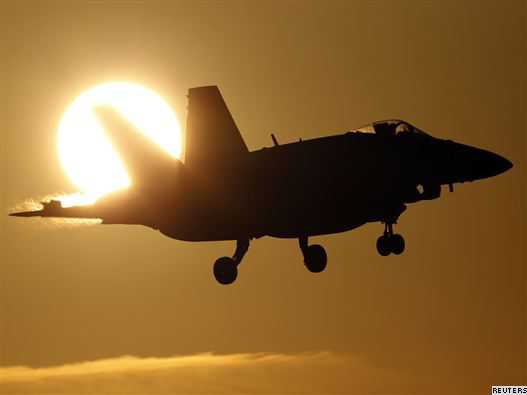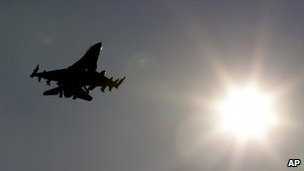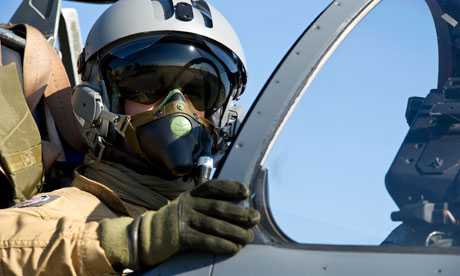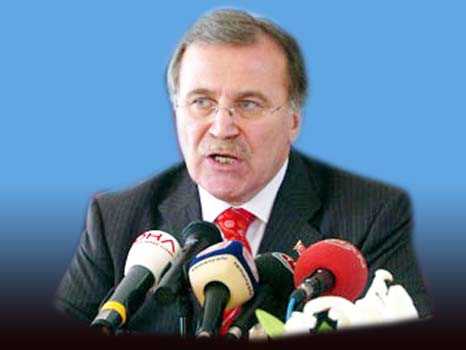NATO ministers have ended a third day of talks over the crisis in Libya without agreement on whether the alliance will assume command of military operations aimed at protecting civilians from forces loyal to leader Muammar Qaddafi.

Coalition operations are in their fifth day of UN-backed air strikes in the North African state, where opposition forces are battling government troops in an effort to oust Qaddafi after four decades of rule.
Allied warplanes bombed air defenses near Tripoli and a loyalist compound outside the besieged rebel city of Misrata, forcing government troops to withdraw tanks from there.
The commander of British aircraft operating over Libya, Air Vice-Marshal Greg Bagwell, said today that Qaddafi’s air force “no longer exists as a fighting force,” and that the allies could now operate “with near impunity” in Libyan airspace.
In Brussels, spokeswoman Oana Lungescu said NATO allies would continue to debate the alliance’s possible role in the enforcement of the UN-mandated no-fly zone over Libya.

Canadian Brigadier General Pierre Saint Amand (left) and NATO spokewoman Oana Lungescu brief the media in Brussels on March 23.
“What you are seeing now is all 28 allies discussing [the operation in Libya] in a constructive spirit,” she said. “They’ve already moved to take the first step in implementing United Nations Security Council Resolution 1973 and I think that it is important that NATO is united and NATO is taking action.”
The resolution adopted a week ago allows for “all necessary measures” to protect the Libyan people from Qaddafi’s security forces.
Turkish Opposition
NATO diplomats who spoke to reporters on condition of anonymity after the meeting said the main obstacle to agreement was Turkish opposition.
Turkey said it objected to NATO taking responsibility for offensive operations that could cause civilian casualties, as well as to the alliance enforcing the UN-mandated no-fly zone while coalition aircraft simultaneously bomb Libyan forces.
Speaking in Ankara, Turkish Foreign Minister Ahmet Davutoglu said, “It would be impossible for us to share responsibility in an operation that some authorities have described as a ‘crusade’” — an apparent reference to the use of that term by Russian Prime Minister Vladimir Putin and Qaddafi himself.
A NATO source who spoke to the Associated Press said Turkey, a Muslim NATO member with major commercial interests in Libya, wanted Western coalition countries to finish their air strikes before NATO assumes command.
But U.S. Defense Secretary Robert Gates said on March 22 that he could not predict when the no-fly zone operation would end, but said the United States wanted to hand over lead command of the operation as early as March 26.
President Barack Obama reinforced that message on March 22 during a stopover in El Salvador on the last leg of his Latin American trip. He said he had “absolutely no doubt” that control could be shifted from the United States to other coalition members within days.
Obama said the United States would remain in a “support role” and provide uniquely U.S. assets, such as radar jamming and intelligence capabilities.

Obama: “We have unique capabilities.”
“We have unique capabilities,” Obama said. “We came in up front fairly heavily, fairly substantially, and at considerable risk to our military personnel and when this transition takes place it is not going to be our planes maintaining the no fly zone.”
Obama, French President Nicolas Sarkozy, and British Prime Minister David Cameron agreed on on March 22 that NATO should play an important role in enforcing the Libyan no-fly zone.
But NATO’s lack of agreement over whether it will assume lead command of the mission adds an element of uncertainty to the White House’s plans to step back from operations.
Progress Seen
Nevertheless, in a joint press appearance today at the State Department with Morocco’s visiting Foreign Minister Taeib Fassi, Clinton said the United States “will continue to support this mission as [it] transfer[s] command and control to NATO.”
Clinton also said the United States had been satisfied with the amount of participation by Arab counties and expected “more announcements” of help in the coming days.
And she said the coalition had “made significant progress” in the first five days of the operation, but added that as long as “Qaddafi is “[directing] his forces to attack his own people’ the need for military intervention will continue.
“It will be up to Qaddafi and his ‘insiders’ to determine what their next steps are but we would certainly encourage that they would make the right decision,” Clinton said, “and not only institute a real, comprehensive cease-fire, but withdraw from the cities and the military actions and prepare for a transition that does not include Colonel Qaddafi.”
Earlier today, NATO warships have begun patrolling off Libya’s coast to enforce a UN-mandated arms embargo.
Canadian Brigadier General Pierre St. Amand of NATO’s military staff told a media briefing today that NATO had received offers for up to 16 vessels to patrol the Mediterranean.
He said Turkey alone had offered five ships and one submarine to join the operation, dubbed Unified Protector, which he said was now “under way.”
Other members offering vessels included Britain, Canada, Greece, Italy, Romania, Spain, and the United States.
Alliance spokeswoman Lungescu said naval operation Unified Protector was important to stop the “flow of arms and mercenaries” into Libya that intelligence reports say is continuing.
Under Attack From ‘Fascists’
As discussions were going on who should take the leading role in the Libya mission, Qaddafi remained defiant.
Addressing a crowd of supporters at his compound in Tripoli on March 22, the Libyan leader said his people were under attack from “fascists” and called on other Muslim countries to “take part in the battle against the crusaders.”
“It’s a new crusade, a crusade against Islam! Long live Islam everywhere! All Islamic armies, take part in the battle!” Qaddafi said.

Muammar Qaddafi addresses supporters at his former Bab al-Aziziya residence in Tripoli.
“Demonstrations are taking place everywhere, in Asia, in Africa, in America, in Europe! Their people are against them! Their people are against them!”
Western warplanes have flown more than 300 sorties over Libya and more than 160 cruise missiles have been fired in the UN-mandated mission.
The strikes have managed to ground Qaddafi’s aircraft and to push back his forces from the brink of rebel stronghold Benghazi, but disorganized and poorly equipped rebels have been unable to dislodge Qaddafi’s forces from the key junction of Ajdabiyah in the east.
As air strikes entered their fifth day, correspondents reported explosions rocked the capital early today.
Reports say warplanes silenced Qaddafi’s artillery and tanks around the last big rebel holdout of Misrata in the west, where residents say the siege is becoming increasingly desperate, with water cut off for days and food running out, and many of the wounded left untreated.
Clashes also were reported today near the rebel-held Zintan near the border with Tunisia, and in the town of Yafran, southwest of Tripoli.
compiled from agency reports




